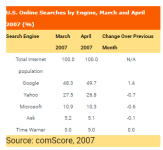I'm not really following it other than hearing The Vergecast discuss it every week these days.
There have also been some headlines, like Google may be paying Apple as much as $19 billion a year to make Google the default search engine on iOS.
Or that MS offered to sell Bing to Apple which declined because of that Google money.
Or MS said the Google-Apple deal is why they got out of search.
Or some contention that if not for the deal, there would be a much more competitive search market.
Yeah I question that contention. Before the first iPhone, Google was already dominant in search. MS poured resources into Bing but got little traction.
Doubtful that the search market would be much different now without the iOS deal. Easy enough for iOS users to set Google as the default search in mobile Safari or bookmark Google's home page.
I really don't believe iOS users would have switched en masse to Bing or DuckDuckGo or any other search engine, unless maybe one of them cut a deal with iOS to be the default.
But nobody else was willing to pay anywhere close to Google.
I would also contend that even if MS did make a deal to get Bing as default on iOS, users would have switched back to Google.
I don't understand how this is an anticompetitive practice. MS still owns the desktop, so no Google search advantage there. Google owns Android. So iOS is a minority share of search client devices. The Google-Apple deal didn't create Google search market share dominance nor consolidate it.
Is it illegal for two companies to enter into a contract? Well supposedly if one has a dominant position, they can't leverage it for another market.
But it seems now the strategy for antitrust prosecution is to redefine markets by segmenting it. So desktop and mobile searches are distinct markets or Apple has monopoly in the iOS ecosystem, which is like saying BMW has monopoly in the market for OEM parts for BMW cars.
There have also been some headlines, like Google may be paying Apple as much as $19 billion a year to make Google the default search engine on iOS.
Or that MS offered to sell Bing to Apple which declined because of that Google money.
Or MS said the Google-Apple deal is why they got out of search.
Or some contention that if not for the deal, there would be a much more competitive search market.
Yeah I question that contention. Before the first iPhone, Google was already dominant in search. MS poured resources into Bing but got little traction.
Doubtful that the search market would be much different now without the iOS deal. Easy enough for iOS users to set Google as the default search in mobile Safari or bookmark Google's home page.
I really don't believe iOS users would have switched en masse to Bing or DuckDuckGo or any other search engine, unless maybe one of them cut a deal with iOS to be the default.
But nobody else was willing to pay anywhere close to Google.
I would also contend that even if MS did make a deal to get Bing as default on iOS, users would have switched back to Google.
I don't understand how this is an anticompetitive practice. MS still owns the desktop, so no Google search advantage there. Google owns Android. So iOS is a minority share of search client devices. The Google-Apple deal didn't create Google search market share dominance nor consolidate it.
Is it illegal for two companies to enter into a contract? Well supposedly if one has a dominant position, they can't leverage it for another market.
But it seems now the strategy for antitrust prosecution is to redefine markets by segmenting it. So desktop and mobile searches are distinct markets or Apple has monopoly in the iOS ecosystem, which is like saying BMW has monopoly in the market for OEM parts for BMW cars.





/cdn.vox-cdn.com/uploads/chorus_asset/file/25047547/236883_Epic_Vs_Google_B_CVirginia.jpg)
